Module 12 Unit 3 教学课件-外语教研版中学英语七年级下
文档属性
| 名称 | Module 12 Unit 3 教学课件-外语教研版中学英语七年级下 |
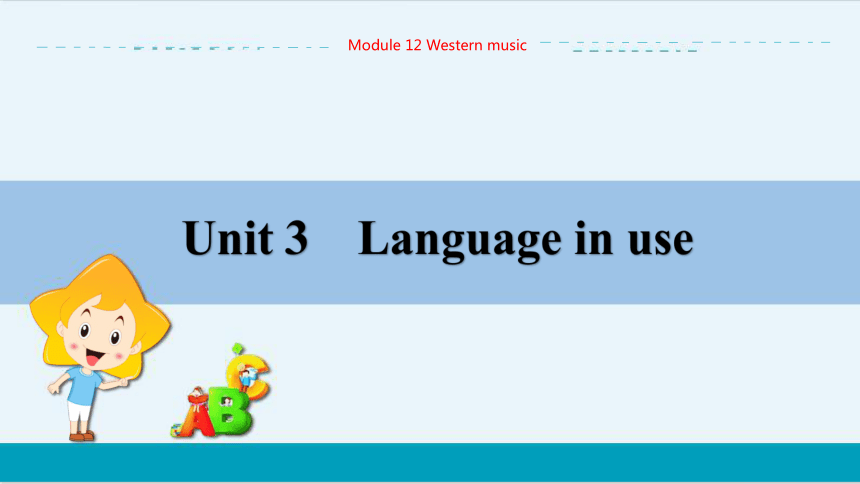
|
|
| 格式 | pptx | ||
| 文件大小 | 1.5MB | ||
| 资源类型 | 试卷 | ||
| 版本资源 | 外研版 | ||
| 科目 | 英语 | ||
| 更新时间 | 2024-02-21 00:00:00 | ||
图片预览

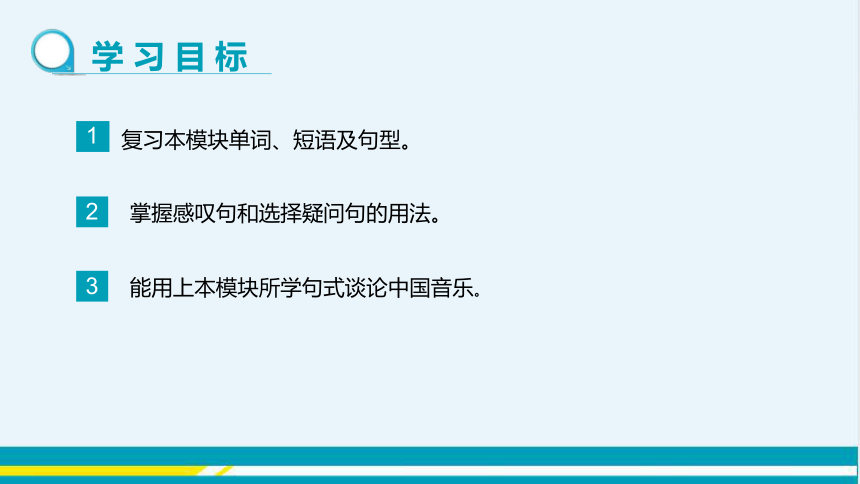

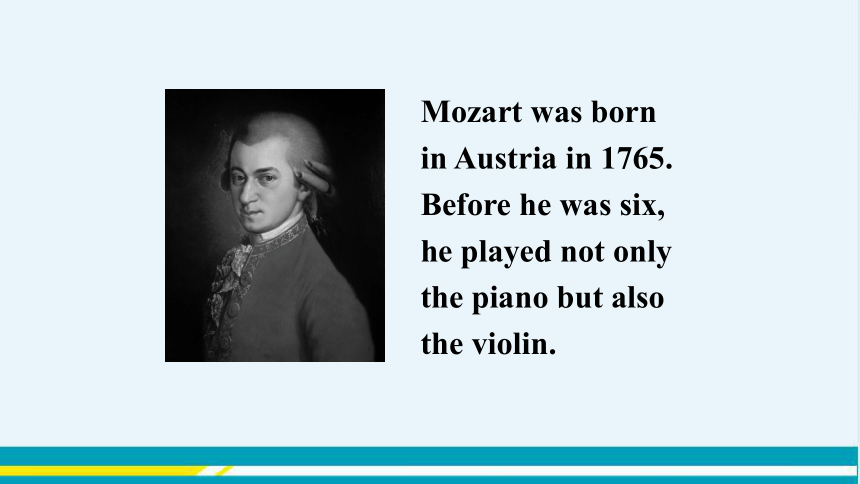
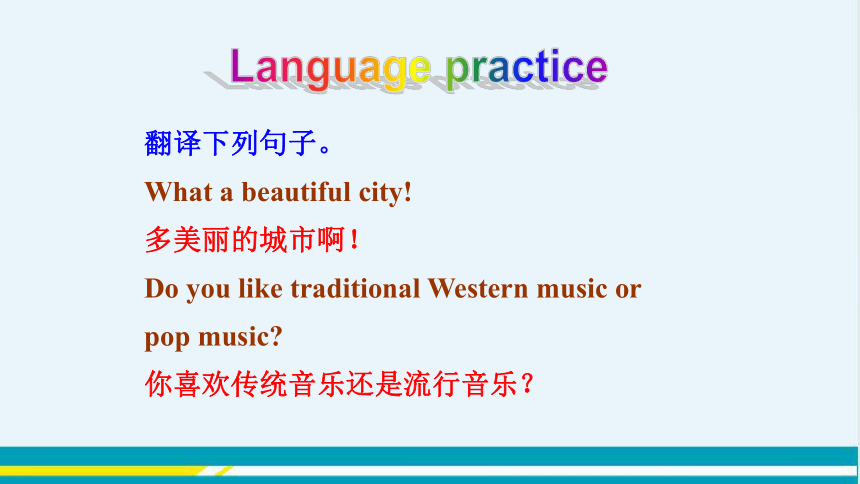


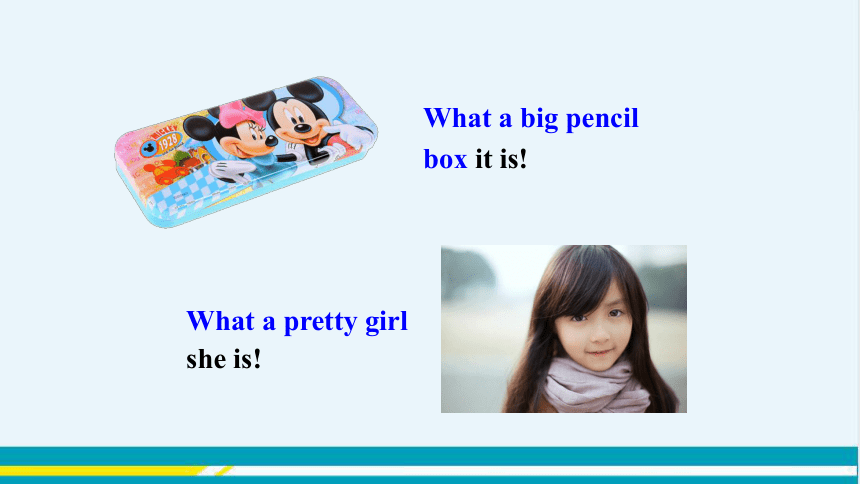
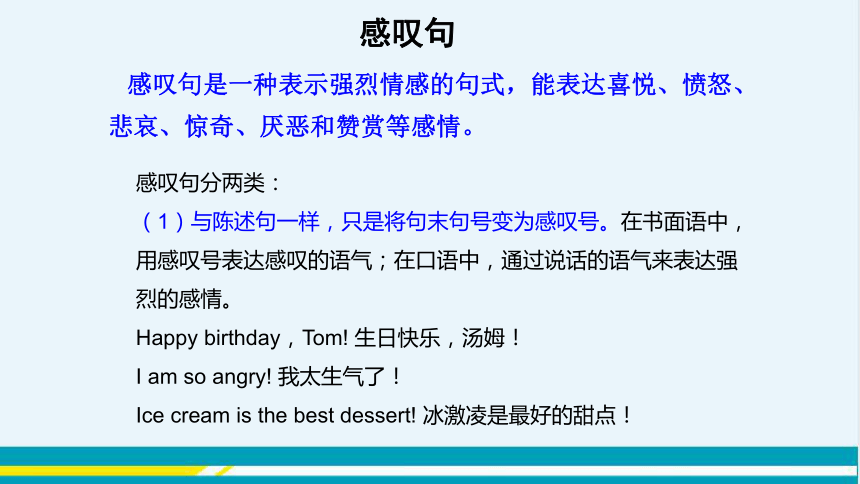
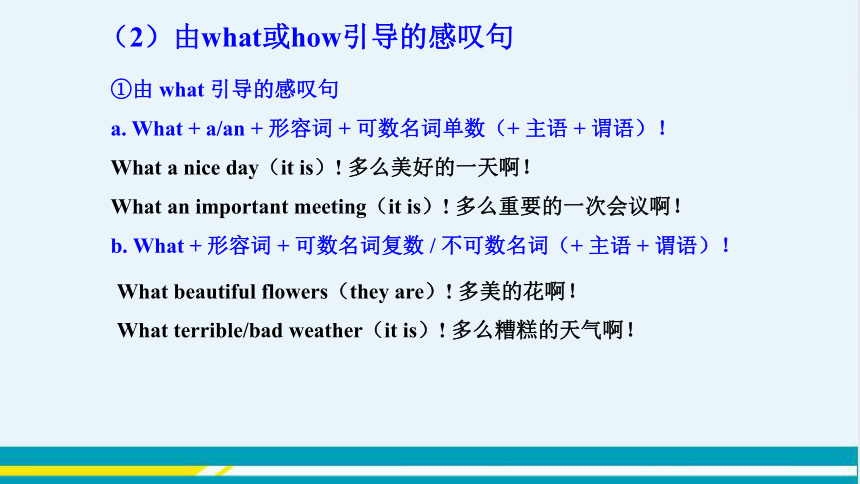
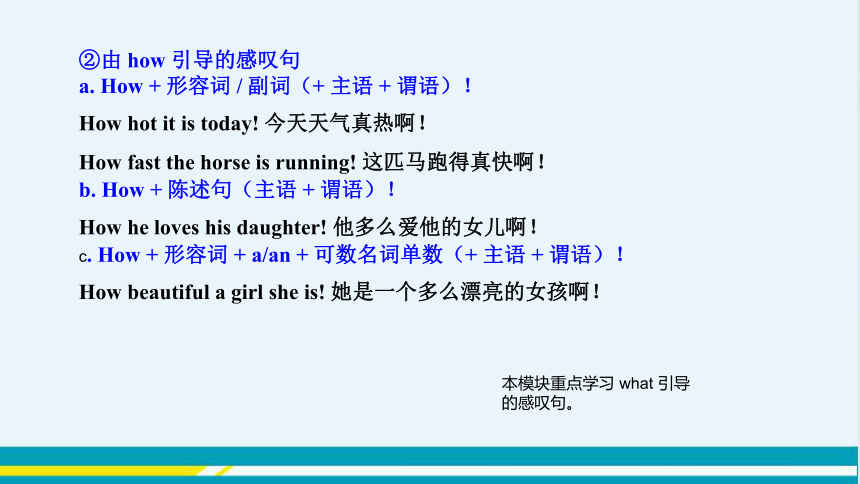
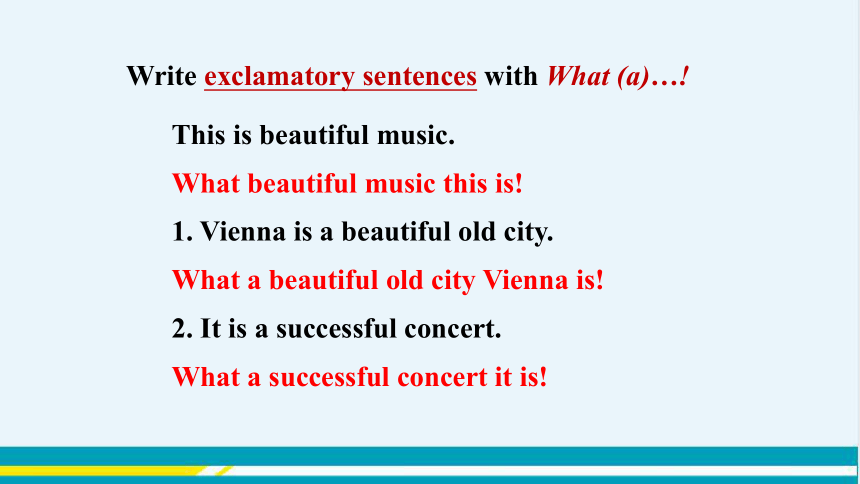
文档简介
(共36张PPT)
Unit 3 Language in use
Module 12 Western music
学 习 目 标
1
2
复习本模块单词、短语及句型。
掌握感叹句和选择疑问句的用法。
能用上本模块所学句式谈论中国音乐。
3
课 堂 导 入
Johann Strauss the elder, wrote and played music for traditional dances, called the waltz.
Revision
Do you know anything about them
Mozart was born in Austria in 1765. Before he was six, he played not only the piano but also the violin.
翻译下列句子。
What a beautiful city!
多美丽的城市啊!
Do you like traditional Western music or pop music
你喜欢传统音乐还是流行音乐?
Language practice
Grammar 1
课 堂 学 习
The flowers are beautiful.
What beautiful flowers they are!
The cat is lovely.
What a lovely cat it is!
What a pretty girl she is!
What a big pencil box it is!
感叹句是一种表示强烈情感的句式,能表达喜悦、愤怒、悲哀、惊奇、厌恶和赞赏等感情。
感叹句
感叹句分两类:
(1)与陈述句一样,只是将句末句号变为感叹号。在书面语中,用感叹号表达感叹的语气;在口语中,通过说话的语气来表达强烈的感情。
Happy birthday,Tom! 生日快乐,汤姆!
I am so angry! 我太生气了!
Ice cream is the best dessert! 冰激凌是最好的甜点!
(2)由what或how引导的感叹句
①由 what 引导的感叹句
a. What + a/an + 形容词 + 可数名词单数(+ 主语 + 谓语)!
What a nice day(it is)! 多么美好的一天啊!
What an important meeting(it is)! 多么重要的一次会议啊!
b. What + 形容词 + 可数名词复数 / 不可数名词(+ 主语 + 谓语)!
What beautiful flowers(they are)! 多美的花啊!
What terrible/bad weather(it is)! 多么糟糕的天气啊!
②由 how 引导的感叹句
a. How + 形容词 / 副词(+ 主语 + 谓语)!
How hot it is today! 今天天气真热啊!
How fast the horse is running! 这匹马跑得真快啊!
b. How + 陈述句(主语 + 谓语)!
How he loves his daughter! 他多么爱他的女儿啊!
c. How + 形容词 + a/an + 可数名词单数(+ 主语 + 谓语)!
How beautiful a girl she is! 她是一个多么漂亮的女孩啊!
本模块重点学习 what 引导的感叹句。
Write exclamatory sentences with What (a)…!
This is beautiful music.
What beautiful music this is!
1. Vienna is a beautiful old city.
2. It is a successful concert.
What a beautiful old city Vienna is!
What a successful concert it is!
3. They are playing noisy drums.
4. It was a wonderful party.
5. Mozart is a famous composer.
What noisy drums they are playing!
What a wonderful party it was!
What a famous composer Mozart is!
Grammar 2
祈 使句
Observe the following sentences carefully. Pay attention to the words in red.
Do you like traditional Western music or pop music
Is this by Strauss or Mozart
3. Is it by the father or the son
4. Shall we go home or stay here
5. Did you come here by bus or by car
选择疑问句
在问句中提供两个或两个以上可选答案的问句叫选择疑问句。选择疑问句中两种或两种以上的情况用 or 连接,回答时不能用 yes 或 no。在口语中,选择疑问句的语调应是第一个选择项读升调,第二个选择项读降调。选择疑问句可以分为一般选择疑问句和特殊选择疑问句两种。
(1)一般选择疑问句
句型:一般疑问句+or +被选择的情况?
— Are you a teacher or a student
你是老师还是学生?
— I’m a student.
我是学生。
— Did you work out the math problem in this way or (in) that way
你是用这种方法还是用那种方法把这道数学题算出来的?
— I did it in that way.
我是用那种方法算出来的。
(2)特殊选择疑问句
句型:特殊疑问句, A or B
— Which is bigger, Beijing or New York
哪个城市大些,北京还是纽约?
— Beijing.
北京。
— When will he leave for London, today or tomorrow
他何时动身去伦敦,今天还是明天?
— Tomorrow.
明天。
【注意】选择疑问句的答语不用 yes 或 no,而是根据实际情况作答。
—Do you like green or red 你喜欢绿色还是红色?
—I like green. 我喜欢绿色。
【拓展】在回答选择疑问句时,除了可以用选择成分作答之外,还可以根据实际情况作答,如用 both 或 neither。
—Do you like green or red 你喜欢绿色还是红色?
—Both. 两者我都喜欢。
1. Write questions.
You / like / pop / traditional music
Do you like pop or traditional music
1. (be) / Strauss / German / Austrian
2. (be) / this / pop / rock
Is Strauss German or Austrian
Is this pop music or rock music
Practice
3. They / play / traditional music / modern music
4. He / play / piano / violin
5. Where / (can) we / hear / rock music / in / New York /
London
Do they play traditional music or modern music
Does he play the piano or the violin
Where can we hear rock music, in New York or in London
Types of music Instruments People
3. Put the words and expressions into the correct column.
drum fan musician piano pop rock traditional music violin
pop
rock
drum
fan
musician
piano
traditional music
violin
Lingling: This is beautiful music.
Who wrote it, Betty
Betty: Beethoven wrote it. He was a great musician. I (1)______his
music.
Lingling: Me too. Did he live at the same time as Mozart
4 Complete the conversation with the correct form of the
words from the box.
come give hear learn love write
love
Betty: Yes, he was born in 1770 and began to (2) ___________music at an early age. He (3) ___________his first piano concert when he was only seven.
Lingling: When did he start to (4)_____music
Betty: Very early. His first work (5) _____out before the age of thirteen.
come give hear learn love write
learn
gave
write
came
Lingling: Was Beethoven famous at that time
Betty: Yes. But he began to lose his hearing.
In the last ten years of Beethoven’s life, he (6)______nothing.
Lingling: That’s sad!
Betty: Yes, but he still played the piano.
He died when he was fifty-six.
heard
come give hear learn love write
1.Did he live at the same time as Mozart 他和莫扎特生活在同一个时代吗?
the same...as... 意为“和……一样……”,same 后跟名词。
He studies in the same school as I do.
他和我在同一所学校里上学。
【拓展】be the same as... 意为“和……一样”,反义短语:be different from。
The colour of your dress is the same as mine.
你的连衣裙的颜色和我的相同。
Language points
2.His first work came out before the age of thirteen.
13 岁之前他的第一部作品就问世了。
come out 此处意为“出版,问世”,主语通常为物。
The magazine comes out every Monday. 这份杂志每周一出版。
【拓展】come out 的其他常见含义:
①(太阳、月亮或星星)出来,出现
The sky cleared and the sun came out. 天空放晴,太阳出来了。
②(花朵)开放
Spring is coming and many flowers begin to come out.
春天来了,许多花开始绽放。
Around the world
Every year, the Vienna New Year’s Concert takes place on 1st January. It is a classical music concert and it always includes pieces of music by the Strauss family. People all over the world watch it on TV and enjoy the music.
Vienna New Year's Concert
Language points
1.Every year,the Vienna New Year’s Concert takes place on 1st January.维也纳新年音乐会在每年 1 月 1 日举办。
take place 此处意为“举行,举办”。
The next meeting will take place on Thursday. 下次会议将在星期四举行。
【辨析】take place 与 happen
take place 一般指经过事先的安排或有准备的事情或活动
happen 一般指偶然或突发性事件
The May Fourth Movement took place in 1919. 五四运动发生在 1919 年。
An accident happened in the street. 那条街上发生了一起事故。
2....it always includes pieces of music by the Strauss family.
……它总是包括施特劳斯家族的几首音乐。
include 及物动词,意为“包含;包括”,侧重指被包含的是整体的一部分,有时也指包含全部,常用于解释或补充说明。
The price includes tax. 这个价格包含税费。
Her job includes looking after the baby.
她的工作包括照看这个婴儿。
Module task:
Talking about
Chinese music
Choose one or two types of Chinese music and
describe them. Use the words from the box.
Say which types of music you like.
Give your reasons.
5. Work in pairs. Talk about one or two types of Chinese
music.
beautiful fast lively
modern sad slow
Now talk about Chinese music in front of the class.
I. 根据要求改写句子。
Betty enjoys fast music.
(用slow music改为选择疑问句)
______ Betty ______ fast music ____ slow music
2. His sister is a beautiful girl.
(改为感叹句)
_____ _____ ________ girl his sister is!
3. The meat is very delicious.
(改为感叹句)
________ ________ meat it is!
Does enjoy or
What a beautiful
What delicious
课 堂 达 标
Ⅱ. 根据汉语提示写出正确的英语句子。
1. 你喜欢红色还是蓝色?
2. 多么大的一个箱子!
3. 你们是骑自行车还是坐公交车去公园的?
4. 多么美味的食物啊!
5. 这些照片多漂亮啊!
Do you like red or blue
What a big box (it is)!
Did you go to the park by bike or by bus
What delicious food (it is)!
How beautiful the photos are!
1. ________ difficult homework we had yesterday!
2. _______ cute dog it is!
3. ________ honest boy Tom is!
4. ________ tasty smell the cake gave off!
5. ________ good time we had on the beach yesterday!
6. ________ exciting news you’ve brought us!
What
What a
What an
What
What a
What
Ⅲ. 完成感叹句
Homework
1. Review the grammar we’ve learned today.
2. Finish the exercises in this module.
Thank you !
Unit 3 Language in use
Module 12 Western music
学 习 目 标
1
2
复习本模块单词、短语及句型。
掌握感叹句和选择疑问句的用法。
能用上本模块所学句式谈论中国音乐。
3
课 堂 导 入
Johann Strauss the elder, wrote and played music for traditional dances, called the waltz.
Revision
Do you know anything about them
Mozart was born in Austria in 1765. Before he was six, he played not only the piano but also the violin.
翻译下列句子。
What a beautiful city!
多美丽的城市啊!
Do you like traditional Western music or pop music
你喜欢传统音乐还是流行音乐?
Language practice
Grammar 1
课 堂 学 习
The flowers are beautiful.
What beautiful flowers they are!
The cat is lovely.
What a lovely cat it is!
What a pretty girl she is!
What a big pencil box it is!
感叹句是一种表示强烈情感的句式,能表达喜悦、愤怒、悲哀、惊奇、厌恶和赞赏等感情。
感叹句
感叹句分两类:
(1)与陈述句一样,只是将句末句号变为感叹号。在书面语中,用感叹号表达感叹的语气;在口语中,通过说话的语气来表达强烈的感情。
Happy birthday,Tom! 生日快乐,汤姆!
I am so angry! 我太生气了!
Ice cream is the best dessert! 冰激凌是最好的甜点!
(2)由what或how引导的感叹句
①由 what 引导的感叹句
a. What + a/an + 形容词 + 可数名词单数(+ 主语 + 谓语)!
What a nice day(it is)! 多么美好的一天啊!
What an important meeting(it is)! 多么重要的一次会议啊!
b. What + 形容词 + 可数名词复数 / 不可数名词(+ 主语 + 谓语)!
What beautiful flowers(they are)! 多美的花啊!
What terrible/bad weather(it is)! 多么糟糕的天气啊!
②由 how 引导的感叹句
a. How + 形容词 / 副词(+ 主语 + 谓语)!
How hot it is today! 今天天气真热啊!
How fast the horse is running! 这匹马跑得真快啊!
b. How + 陈述句(主语 + 谓语)!
How he loves his daughter! 他多么爱他的女儿啊!
c. How + 形容词 + a/an + 可数名词单数(+ 主语 + 谓语)!
How beautiful a girl she is! 她是一个多么漂亮的女孩啊!
本模块重点学习 what 引导的感叹句。
Write exclamatory sentences with What (a)…!
This is beautiful music.
What beautiful music this is!
1. Vienna is a beautiful old city.
2. It is a successful concert.
What a beautiful old city Vienna is!
What a successful concert it is!
3. They are playing noisy drums.
4. It was a wonderful party.
5. Mozart is a famous composer.
What noisy drums they are playing!
What a wonderful party it was!
What a famous composer Mozart is!
Grammar 2
祈 使句
Observe the following sentences carefully. Pay attention to the words in red.
Do you like traditional Western music or pop music
Is this by Strauss or Mozart
3. Is it by the father or the son
4. Shall we go home or stay here
5. Did you come here by bus or by car
选择疑问句
在问句中提供两个或两个以上可选答案的问句叫选择疑问句。选择疑问句中两种或两种以上的情况用 or 连接,回答时不能用 yes 或 no。在口语中,选择疑问句的语调应是第一个选择项读升调,第二个选择项读降调。选择疑问句可以分为一般选择疑问句和特殊选择疑问句两种。
(1)一般选择疑问句
句型:一般疑问句+or +被选择的情况?
— Are you a teacher or a student
你是老师还是学生?
— I’m a student.
我是学生。
— Did you work out the math problem in this way or (in) that way
你是用这种方法还是用那种方法把这道数学题算出来的?
— I did it in that way.
我是用那种方法算出来的。
(2)特殊选择疑问句
句型:特殊疑问句, A or B
— Which is bigger, Beijing or New York
哪个城市大些,北京还是纽约?
— Beijing.
北京。
— When will he leave for London, today or tomorrow
他何时动身去伦敦,今天还是明天?
— Tomorrow.
明天。
【注意】选择疑问句的答语不用 yes 或 no,而是根据实际情况作答。
—Do you like green or red 你喜欢绿色还是红色?
—I like green. 我喜欢绿色。
【拓展】在回答选择疑问句时,除了可以用选择成分作答之外,还可以根据实际情况作答,如用 both 或 neither。
—Do you like green or red 你喜欢绿色还是红色?
—Both. 两者我都喜欢。
1. Write questions.
You / like / pop / traditional music
Do you like pop or traditional music
1. (be) / Strauss / German / Austrian
2. (be) / this / pop / rock
Is Strauss German or Austrian
Is this pop music or rock music
Practice
3. They / play / traditional music / modern music
4. He / play / piano / violin
5. Where / (can) we / hear / rock music / in / New York /
London
Do they play traditional music or modern music
Does he play the piano or the violin
Where can we hear rock music, in New York or in London
Types of music Instruments People
3. Put the words and expressions into the correct column.
drum fan musician piano pop rock traditional music violin
pop
rock
drum
fan
musician
piano
traditional music
violin
Lingling: This is beautiful music.
Who wrote it, Betty
Betty: Beethoven wrote it. He was a great musician. I (1)______his
music.
Lingling: Me too. Did he live at the same time as Mozart
4 Complete the conversation with the correct form of the
words from the box.
come give hear learn love write
love
Betty: Yes, he was born in 1770 and began to (2) ___________music at an early age. He (3) ___________his first piano concert when he was only seven.
Lingling: When did he start to (4)_____music
Betty: Very early. His first work (5) _____out before the age of thirteen.
come give hear learn love write
learn
gave
write
came
Lingling: Was Beethoven famous at that time
Betty: Yes. But he began to lose his hearing.
In the last ten years of Beethoven’s life, he (6)______nothing.
Lingling: That’s sad!
Betty: Yes, but he still played the piano.
He died when he was fifty-six.
heard
come give hear learn love write
1.Did he live at the same time as Mozart 他和莫扎特生活在同一个时代吗?
the same...as... 意为“和……一样……”,same 后跟名词。
He studies in the same school as I do.
他和我在同一所学校里上学。
【拓展】be the same as... 意为“和……一样”,反义短语:be different from。
The colour of your dress is the same as mine.
你的连衣裙的颜色和我的相同。
Language points
2.His first work came out before the age of thirteen.
13 岁之前他的第一部作品就问世了。
come out 此处意为“出版,问世”,主语通常为物。
The magazine comes out every Monday. 这份杂志每周一出版。
【拓展】come out 的其他常见含义:
①(太阳、月亮或星星)出来,出现
The sky cleared and the sun came out. 天空放晴,太阳出来了。
②(花朵)开放
Spring is coming and many flowers begin to come out.
春天来了,许多花开始绽放。
Around the world
Every year, the Vienna New Year’s Concert takes place on 1st January. It is a classical music concert and it always includes pieces of music by the Strauss family. People all over the world watch it on TV and enjoy the music.
Vienna New Year's Concert
Language points
1.Every year,the Vienna New Year’s Concert takes place on 1st January.维也纳新年音乐会在每年 1 月 1 日举办。
take place 此处意为“举行,举办”。
The next meeting will take place on Thursday. 下次会议将在星期四举行。
【辨析】take place 与 happen
take place 一般指经过事先的安排或有准备的事情或活动
happen 一般指偶然或突发性事件
The May Fourth Movement took place in 1919. 五四运动发生在 1919 年。
An accident happened in the street. 那条街上发生了一起事故。
2....it always includes pieces of music by the Strauss family.
……它总是包括施特劳斯家族的几首音乐。
include 及物动词,意为“包含;包括”,侧重指被包含的是整体的一部分,有时也指包含全部,常用于解释或补充说明。
The price includes tax. 这个价格包含税费。
Her job includes looking after the baby.
她的工作包括照看这个婴儿。
Module task:
Talking about
Chinese music
Choose one or two types of Chinese music and
describe them. Use the words from the box.
Say which types of music you like.
Give your reasons.
5. Work in pairs. Talk about one or two types of Chinese
music.
beautiful fast lively
modern sad slow
Now talk about Chinese music in front of the class.
I. 根据要求改写句子。
Betty enjoys fast music.
(用slow music改为选择疑问句)
______ Betty ______ fast music ____ slow music
2. His sister is a beautiful girl.
(改为感叹句)
_____ _____ ________ girl his sister is!
3. The meat is very delicious.
(改为感叹句)
________ ________ meat it is!
Does enjoy or
What a beautiful
What delicious
课 堂 达 标
Ⅱ. 根据汉语提示写出正确的英语句子。
1. 你喜欢红色还是蓝色?
2. 多么大的一个箱子!
3. 你们是骑自行车还是坐公交车去公园的?
4. 多么美味的食物啊!
5. 这些照片多漂亮啊!
Do you like red or blue
What a big box (it is)!
Did you go to the park by bike or by bus
What delicious food (it is)!
How beautiful the photos are!
1. ________ difficult homework we had yesterday!
2. _______ cute dog it is!
3. ________ honest boy Tom is!
4. ________ tasty smell the cake gave off!
5. ________ good time we had on the beach yesterday!
6. ________ exciting news you’ve brought us!
What
What a
What an
What
What a
What
Ⅲ. 完成感叹句
Homework
1. Review the grammar we’ve learned today.
2. Finish the exercises in this module.
Thank you !
同课章节目录
- Module 1 Lost and found
- Unit 1 Whose bag is this?
- Unit 2 Are they yours?
- Unit 3 Language in use
- Module 2 What can you do ?
- Unit 1 I can play the piano
- Unit 2 I can run really fast
- Unit 3 Language in use
- Module 3 Making plans
- Unit 1 What are you going to do at the weekends?
- Unit 2 We're going to cheer the players.
- Unit 3 Language in use
- Module 4 Life in the future
- Unit 1 Everyone will study at home
- Unit 2 Every family will have a small plane.
- Unit 3 Language in use
- Module 5 Shopping
- Unit 1 What can I do for you?
- Unit 2 You can buy everything on the Internet
- Unit 3 Language in use
- Module 6 Around town
- Unit 1 Could you tell me how to get to the Nationa
- Unit 2 The London Eye is on your right.
- Unit 3 Language in use
- Revision module A
- Module 7 My past life
- Unit 1 I was born in a small village.
- Unit 2 I was born in Quincy.
- Unit 3 Language in use
- Module 8 Story time
- Unit 1 Once upon a time….
- Unit 2 Goldilocks hurried out of the house.
- Unit 3 Language in use
- Module 9 Life history
- Unit 1 He left school and began work at the age of
- Unit 2 He decided to be an actor.
- Unit 3 Language in use
- Module 10 A holiday journey
- Unit 1 What did you do?
- Unit 2 This morning we took a walk.
- Unit 3 Language in use
- Module 11 Body language
- Unit 1 They touch noses!
- Unit 2 Here are some ways to welcome them.
- Unit 3 Language in use
- Module 12 Western music
- Unit 1 It's so beautiful!
- Unit 2 Vienna is the centre of European classical
- Unit 3 Language in use
- Revision module B
